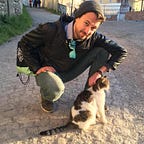Who was the first to live happily ever after?
For whatever reason, happily ever after became the standard expectation for many American millennials. Disney movies didn’t help; neither did the American Dream destiny that we were all born to achieve; regardless of our social class or circumstances of birth, we were not only going to live, but thrive.
According to the Oxford English Dictionary, the first usage of the phrase happily ever after can be found in a 1702 English translation of Giovanni Boccaccio’s Decamerone (shoutout to Laurel on StackExchange for the research) which is a series of novellas from the 14th century Italian writer.
In this particular story, a beautiful young woman named Bartolomea is kidnapped from her husband, an old judge named Riccardio, by the much-younger pirate Paganino. After Riccardio confronts them, Paganino offers to give her up, if she recognizes and wishes to be with him. She does neither. Riccardio leaves, and dies shortly soon after.
Paganino, hearing the News, married the Widow, and as they were very well acquainted, so they lived very lovingly, and happily, ever after.
So let me get this straight… the very first happily ever after belonged to a pirate and his stolen bride? Imagine that.
They were very well-acquainted, so they lived lovingly, and happily, ever after. If only kids these days had such a low bar, we’d actually be getting married and having children.
Happily ever after projects one moment onto an entire lifetime; compressing a whole life into one neat, compact package. Not very practical for a species who lives a long-term life with a short-term brain.
So is there another option?
Axing the happily part feels incomplete. And they lived. The end.
And then what? Does our natural craving for a conclusion require us to neatly and succinctly tie up every story? What happens if we don’t?
Even today as happily ever after skepticism is on the rise, we continue to perpetuate this ideal to young children.
On May 12, 2017, the fireworks show at the Magic Kingdom in Disney World changed its name from Wishes to Happily Ever After. This message causes my eyes to do a complete 180 into the back of my head and my blood pressure to rise. Really, Disney? This is what we’re going to keep telling kids… there is a happily ever after? Preying on one of our biggest human vulnerabilities? You’d think we’d have this figured out by now.
In the dialogue of the show, the narrator suggests being brave enough to listen, and bold enough to pursue your dreams. These are nice ideas. But to accomplish this, in order to live your happily ever after, suggests to children there is a happily ever after. The difference between these two messages is subtle. The happily ever after message is a neatly-wrapped bow on the story of being bold enough to pursue your dreams. This over-simplified conclusion to how life goes may be used as a device for an impatient parent to end a conversation with a frustratingly curious child who wants to know how life works.
Maybe the interpretation of happily ever after evolves over time. This gross oversimplification is not fully grasped by younger audiences; happily ever after at 10 sounds like an endless life of pizza and puppies, while happily ever after at 40 might sound like life doesn’t suck. Comprehension of happiness vs. pleasure is one gateway to becoming an adult.
The idea that there is a better life than the one right now is a highly-profitable Blind Spot. If you’re not living your happily ever after yet, don’t worry… you’re almost there, and I would love to help you on your journey (for only $497, if you order today). What amount is worth it for you to pay to live your happily ever after?
In a world with skyrocketing mental health issues, happily ever afters are doing us no favors. Future generations can’t afford to continue down the path of least resilience. And they lived. The end isn’t sexy, but neither is most of life.
Happily ever afters, Disney movies, and resilience are just a few of the topics in the upcoming book, Avocado Toast and Other Millennial Insights, due out later in 2020.
